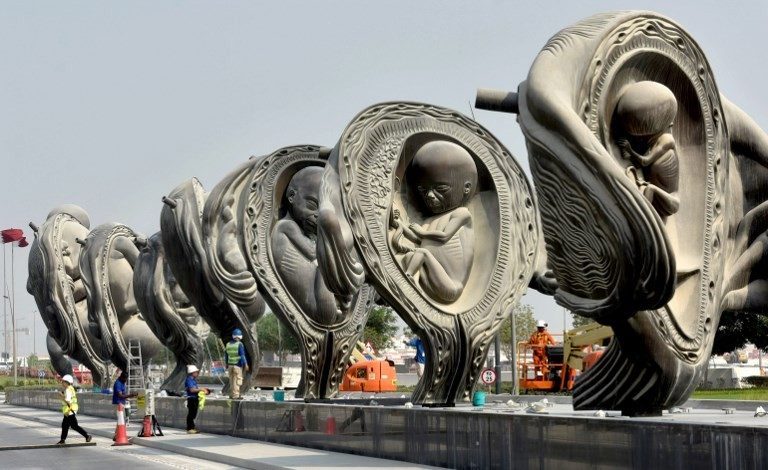Depression and anxiety are major mental health risks for pregnant women and new mothers. Using a well known western approach, specialist women’s and children’s hospital Sidra Medicine’s unique programme seeks to help Qatar’s women.
An innovative Mothers and Babies project has been launched by Sidra Medicine to introduce a cognitive behavioural intervention that has been proven to work with pregnant women at risk of depression and anxiety worldwide.
The project, funded by the renowned Qatar National Research Fund and led by one of the Clinical Psychologists at Sidra, Dr. Sawssan Ahmed, is designed to help understand and prevent postpartum depression and anxiety.
The perinatal health clinic in Sidra Medicine is one of the first of its kind in Qatar but it is also one of few in the region, Dr. Sawssan tells Doha News. With focus on the assessment and diagnosis of pregnant women, as well as those in the postpartum stage, professionals from across Qatar’s healthcare providers – including those trained at Hamad, PHCC, Doha Institute of Graduate Studies and Weill Cornell – deliver the globally known yet regionally-new Cognitive Behavioural Therapy (CBT).
“Cognitive behavioural therapy is the gold standard for psychological intervention for many mental illnesses, particularly depression and anxiety,” Dr. Sawssan explains to Doha News.
“CBT is utilised in clinical settings and studied a lot in research as something that works for depression and anxiety.”
However, CBT was developed in the western world and uses western-based principles at its core. For this reason, not enough research has been carried out to prove its effectiveness on other cultures, including here in the Middle East.
The four-year project, launched in collaboration with Northwestern University Feinburg School of Medicine, hopes to take this established, researched and well-utilised western approach to a Middle Eastern culture, delivering the CBT service in Arabic to pregnant women in Qatar.
Read also: Dear Mum: Relax, your ‘best’ is enough this pandemic
For this reason, the project has strict guidelines for those it takes on. Only Arabic-speaking women in their second trimester – or earlier – will be accepted onto the programme. Patients must be a Qatar resident and over the age of 18 to take part, Dr Sawssan clarifies, noting some other requirements are needed.
Mental health
There is no arguing that mental health is important for the care of pregnant women. Studies show that 40 to 60 percent of women who show signs of postpartum depression and anxiety also showed similar red flags throughout the pregnancy. These clues helps healthcare workers like Dr. Sawssan to expect the conditions after pregnancy.
The clinic aims to better mental health for pregnant women and mothers but one of its subgoals is to test the intervention on women that have been diagnosed with gestational diabetes (GDM) – a condition that is first diagnosed when a woman is pregnant.
While GDM has been identified as a factor in depressed and anxious mothers, it has also proven to adversely affect the baby. According to a recent study, 24% of pregnant women in Qatar were diagnosed with diabetes and around 21% of them had gestational diabetes.
In short, helping women with GDM not only helps them psychologically, but it could potentially assist in their management of diabetes.
“It is not a selfish thing to do something for yourself”
“Our thoughts, feelings, and behaviours are all interconnected. When we have a feeling, sometimes we don’t know why we feel a certain way and sometimes it is because we are thinking a certain way. If we are able to change the way someone is thinking so that they could think in a more positive way about a situation, they may feel a bit better,” Dr. Sawssan says.
“At the same time, if you engage in certain behaviours, you will also feel better. If you can work on the thoughts and the behaviours, you can improve people’s feelings,” she adds.
The main goal for the Mother and Babies collaboration is to prove that there is a culturally valid and evidence based intervention for pregnant women that are at risk of mental illness. If this can be proven, then it is hoped to be beneficial enough to use nation- and even region-wide. The bullet-proof approach would then be deemed scientifically sound and culturally appropriate.
“We should be thoughtful when we are doing intervention by taking the culture and science together,” says Dr. Sawssan.
Read also: Spotlight on Mum: Surviving a pandemic as a full-time teacher, PhD student and mother of four
All in all, Qatar Mothers and Babies says it is there to assist women in understanding the importance of their physical and mental health – both of which go hand in hand.
“It is important for the mum to understand that taking care of herself while she is pregnant and afterwards will not only help her feel better but it helps the child, family, and marital relationship- it is all related. It is not a selfish thing to do something for yourself,” Dr. Sawssan says.
Chereen Shurafa is a Doha based community counsellor, writer, and certified change coach. She is the founder of “Dear Chereen”, an online platform dedicated to mindfulness, mental health, and inspiration.
Follow Doha News on Twitter, Instagram, Facebook and Youtube







